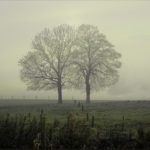We run our website the way we wished the whole internet worked: we provide high quality original content with no ads. We are funded solely by your direct support. Please consider supporting this project.

How Jesus Cursed the Curse
People who have committed to following Jesus are called to mimic even this aspect of Jesus’ life. As much as possible, we are to model what creation will look like when God’s Kingdom is fully come. We are to manifest as much as possible God’s original design for creation not only by how we love one another, but also by how we care for animals and the creation.
There are a number of points in the Gospel where Jesus treats nature in a way that builds on the Old Testament theme of Yahweh “rebuking” hostile waters and various sea monsters that ancient people believed encompassed and threatened the earth (e.g. Ps 18:15; 104:7; 106.9). When Jesus rebukes the storm, he’s playing the role of Yahweh in the Old Testament and exerting his authority over forces of evil that cause seas to behave in chaotic and threatening ways. Something similar is indicated when Jesus at another point calmed the storm and walked on the waters.
Closely related to this is an episode where Jesus cursed a fig tree (Mk 11:12-143; Mt 21:18-19). What makes this cursing particularly interesting is that Mark tells us the reason the fig tree had no figs was because it wasn’t the season for figs. It thus seems like Jesus’ judgment on the tree is completely arbitrary. But once we understand it against the background of the apocalyptic thought of Jesus’ day, we see that this is not the case.
In the apocalyptic worldview, all aspects of nature were believed to be under the guardianship of various angels. Some of these angels had rebelled and were now misusing their God-given authority. Everything from plagues to earthquakes to famines and violent storms were believed by many to be the consequence of fallen powers corrupting nature. Not only this, but barren or infected fig trees in apocalyptic thought were symbols of Satan’s curse, and the fruitfulness of fig trees had become a how creation will be restored when the Messiah comes and frees creation from the curse.
In this light, we should interpret Jesus’ cursing of the fig tree as an act of “cursing the curse.” Jesus is demonstrating that, where and when God reigns, the demonic corruption of nature will be overcome and nature will begin to be restored to the state God originally intended it to be in. He is pointing to a time when the whole cosmos will be delivered from the powers of darkness, when there shall be no more famines or life-threatening storms, and when there shall be no more violence in the animal kingdom or between humans and animals.
Isaiah tells us that, in this day, the wolf will live in peace with the lamb. The lion will walk alongside the calf as a little child leads them. Bears will feed alongside of cows, and lions “will eat straw like the ox” (11: 6-9). Humans will be restored to their rightful place as loving lords of the earth (Gen. 1:26-28).
Photo credit: Rich_Lem via Visualhunt.com / CC BY-NC-SA
Category: General
Tags: Peace, Spiritual Warfare
Related Reading

What To Do with the Bible’s Talk of Satan
Recently, Roger Olson raised the question on his blog about why Satan is ignored in modern theology. He observed how Greg’s theology takes an “obvious, ‘up front,’ blatant belief in a very personal, very real, very active Satan who has great power in the world.” Because we often have so little to say about Satan…

The Purpose of the Church
Concerning the preaching of the Gospel, Paul wrote that God’s intent was that “through the church the wisdom of God in its rich variety might now be made known to the rulers and authorities in the heavenly places … in accordance with the eternal purpose that he has carried out in Christ Jesus our Lord”…

The Destiny of God’s People
Jesus represents the realization of God’s glorious dream for humanity. In Christ, we see what we who are in Christ are destined to be. As a stick placed in a river is destined to be carried to whatever body of water the river runs to, so all who have allowed themselves to be drawn by…

The Principle of Non-Violence
Several years ago, Woodland Hills Church hosted a Q&A with Greg Boyd and Paul Eddy to answer questions that arose from their exploration of Anabaptism. In this short clip, they address the Anabaptist principle of non-violence, and point out that this principle goes far beyond refraining from external violence. The call to non-violence is grounded in our…

A Non-Violent Creation
A biblical teaching that we often overlook regarding the centrality of non-violence concerns God’s original vision of creation. We have grown so accustomed to the violence we experience as a part of nature that we don’t even question whether it is supposed to be the way it is. However when we see God’s vision for…

Is Suffering Part of God’s Secret Plan?
In the Christian tradition since Augustine, the most common explanation for the apparent arbitrariness of life and God’s interaction with humanity has been God’s mysterious will—his “secret plan,” as Calvin says. Whether or not a child is born healthy or a wife is killed by an intruder is ultimately decided by God. If we ask…
